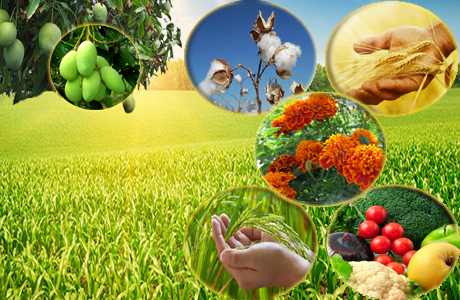Ensuring the success of
agriculture
By S M Hali
 The
fertiliser industry is the backbone of Pakistanís agro based
economy and continues its supportive role through the supply
of fertilisers at hugely competitive prices to the farming
community.
The
fertiliser industry is the backbone of Pakistanís agro based
economy and continues its supportive role through the supply
of fertilisers at hugely competitive prices to the farming
community.
Pakistanís economy is
dependent on agriculture since 67 percent of the countryís
population resides in rural areas and is directly or
indirectly linked with agriculture for its livelihood.
Agriculture accounts for
about 25 percent of its GDP and employs about 43 percent of
the labour force. Pakistanís most agriculturally rich
province is Punjab, where wheat and cotton are high yield
crops besides having superior quality of oranges.
Mango orchards are mostly
found in Sindh and Punjab provinces, making Pakistan the
worldís fourth largest producer of mangoes.
As per a latest report by the
UN Food and Agriculture Organisation (FAO), Pakistan is one
of the 10 major producers of wheat in the world with an
average of 24 million tonnes output per season.
Pakistan has a total land
area of 80 million hectares. Of this, 22 million hectares
are used for crop production. About 18 million hectares (80
percent) of the cultivated land is irrigated while the
remainder is under arid farming.
The importance of agriculture cannot be underscored since it
feeds the whole rural and urban population of Pakistan
besides exporting wheat, rice, pulses and vegetables to
Afghanistan.
Realising its importance,
Pakistanís planners and policymakers are keen to provide
support to farmers and enhance the annual yield.
High quality seeds, superior
fertilisers, abundant water supply, sunshine and timely use
of pesticides ensure good crops.
The fertiliser industry is
the backbone of Pakistanís agro based economy and continues
its supportive role through the supply of fertilisers at
hugely competitive prices to the farming community as
opposed to international rates.
The driving force to promote
fertiliser product is to overcome food crises through
increasing per acre yield from decreasing cultivatable land.
Pakistanís fertiliser
industry comprises of the Fauji Fertiliser Company (FFC),
Engro, Dawood Hercules and ICI. Of these, FFC merits mention
since it is one of the success stories of Pakistanís public
sector enterprises (PSEs).
In a bleak milieu, where PSEs
are incurring huge annual losses, FFC is not only the market
leader, being the largest chemical fertiliser producer of
Pakistan, it is amongst the highest contributories to the
national economy.
It was established as a joint
venture between Fauji Foundation Pakistan and M/S Haldor
Topsoe A/S Denmark in 1978, where Fauji Foundation holds the
majority shares and leads the board.
The Privatisation Commission of Pakistan and the Prime
Ministerís (PMís) committee that is evaluating the
performance of 69 state sector companies has concluded that
the annual losses incurred by PSEs are more than Rs 500
billion.
Amidst this depressing
statistic, FFC stands out as a whiff of fresh air since it
is not only earning profits but 98 percent of the profits
are offered to the shareholders.
Its 57 percent shares belong
to the general public while the remaining 43 percent shares
are being maintained by the Fauji Foundation.
FFCís tax contribution in the
year 2013 was Rs 43.5 billion, the tax paid from 2009 to
2013 was Rs 142 billion whereas the aggregate tax
contributions from its inception to the end of year 2013
were Rs 247.9 billion.
FFC has been amongst the top
25 companies at the Karachi Stock Exchange (KSE) since 1994
and has been declared number one in 1997, 2010, 2011 and
2012.
The secret of its success lies in its endeavour to diversify
and pay back to society.
In energy starved Pakistan,
FFC has pioneered wind energy by setting up a 50 MW wind
power project at Jhampir in Sindh, which provides clean,
green and sustainable energy to the national grid.
The success of the project
has invited huge investment in the wind energy sector for
Pakistan.
Natural gas, one of Godís gifts to Pakistan, has multiple
uses. It is a feed product in fertiliser production while
motor vehicles utilise it as an alternate fuel, besides
domestic consumption of heating and cooking.
In transportation and
domestic uses, natural gas can be substituted by alternate
sources but in fertiliser production gas is the main
ingredient with no alternate or substitute.
Pakistanís agro-based economy
should take cognisance of this obligation while formulating
its national gas distribution and subsidy policy.
In the field of education, FFC has adopted and assisted over
50 government schools and colleges through infrastructure
and educational and teaching support, catering to about
15,000 boys and girls students.
Annually, more than 250
students are awarded scholarships for institutions such as
LUMS, Wah Engineering College, FC College and Cadet College
Gothki.
In order to sustain the
health sector, FFC has made numerous contributions,
including grants to various hospitals, establishing coronary
care units and burn units, and running free medical camps
for deprived communities throughout Pakistan.
A notable involvement has
been in disaster relief and rehabilitation, especially in
Balochistan and Sindh.
It is small wonder then that the Privatisation Commission
recommends other PSEs to emulate FFCís best practices and
turn around their organisations to profit earning units
rather than lingering behind.
February 2015
Source: Daily
Times